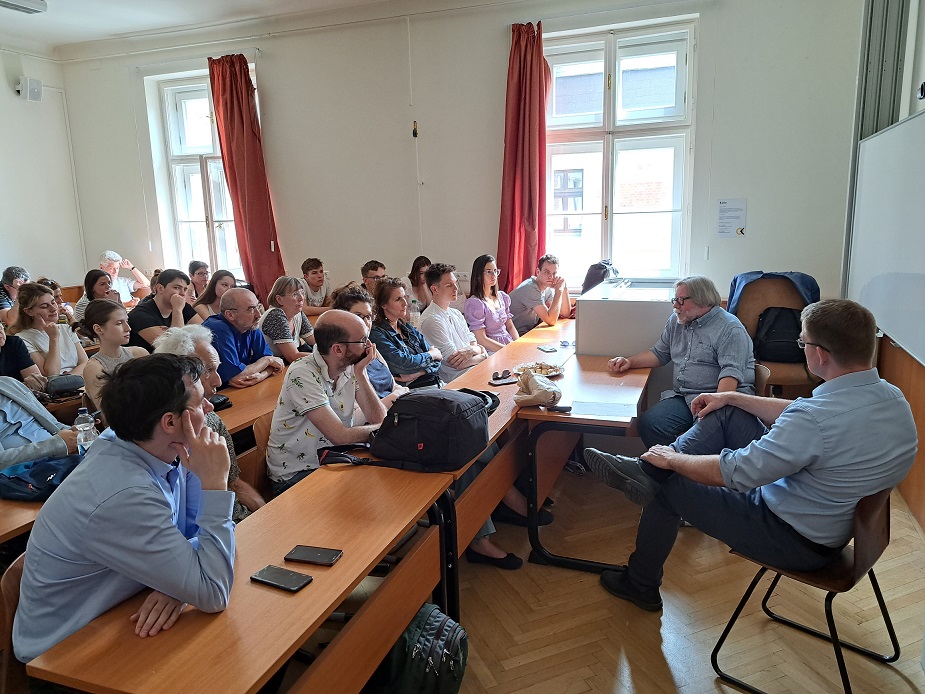Putin’s War: Corvinus lecturer presents his new book

At the event, Zoltán Sz. Bíró explained that the book titled ‘Putin’s War’ has been produced upon request as the 24th item of the Progress Series (Gondolat Publishing House). “At first, my feeling was that I am not the right person to write a book about Ukraine and I am not a military expert either, but then I felt it to be my patriotic duty to write about that subject. It is not easy to write about the prospects of the war while the war is going on,” said Sz. Bíró. The expert thanked Ilona Kiss, the editor of the book, for her high-quality work.
How has the Russian leadership managed to convince society?
According to the author, one of the most important questions is how Ukraine-Russia relations have developed and how Russian society has been tuned into the war, as polls show that 75 percent of people support the “special operation”. According to Zoltán Sz. Bíró, people are afraid in a closed autocracy; however, many of them certainly think this way with conviction. The Russian leadership has managed to convince Russian society, making people believe that this is a just war and, in some way, a continuation of the Second World War. In response to the question of András Rácz about the point in time when he was sure that there would be a war, Sz. Bíró said that he had thought almost to the last minute that there would be no war. Then he had to realise that the Russians “live in another dimension”. Sz. Bíró referred to the fact that, at a G20 summit earlier, Merkel and Putin had had a long talk, after which Merkel had stated that Putin lived in a different world, but the German Chancellor had failed to draw the right conclusion, unfortunately. The author of the book also shared with the audience: he had thought that if the war did break out, it would be a long war.
Answering a question by Rácz, Sz. Bíró said that, it is known, for example, that Putin refuses to use the internet and relies on paper-based folders placed before him for getting information, and what is included in folders placed before him is what he wants to hear. Asked whether this war is Putin’s war indeed, Sz. Bíró said yes, adding that Russia is now a consolidated autocracy, the Russian president is almost impossible to replace, he is planning his future up to 2036, and it is no longer a rule that he may be president only twice. “Putin had worked hard to create this situation,” the author of the book said. He added: it had already been a serious warning sign at the elections for the State Duma in late 2003 that, though they would have won by a huge margin even if they had held fair elections, they still cheated. In the 2011 elections, inequality in campaigns was not enough fraud, they had also tampered with vote counting, “diverting” some 16-17% of the votes. According to Sz. Bíró, Putin had done all this very deliberately and carefully.
About the difference between autocracy and dictatorship
The author also said that the most important difference between autocracy and dictatorship is that in autocracy there is still freedom: you may leave the country or write the truth, which reaches only few people though. Autocracy is operated through pressure and manipulation, the question being when violence is started to be used. András Rácz also asked the author to what extent he thinks this war to be that of the Russian people. Zoltán Sz. Bíró pointed out that 1.1 million people from Russian society had already left the country in the first phase of the war. However, many people remained in Russia, many of them taking to the streets to express their opinions and disagreements. “I bow my head to them: They may not be able to leave Russia for some reason. I do not think that Russians bear universal responsibility!” – the author of the book explained his opinion.
Then, the audience was invited to ask questions from the author in the packed room. A graduating student wanted to know if the author of the book saw a possible successor who could enable Putin to enjoy a few years of quietude. Zoltán Sz. Bíró replied by saying: “It is a feature of autocracies that, when a talented candidate for successor emerges, the power holder does everything to marginalise the person concerned, and the candidate for successor may even be physically destroyed,” he said. He added: all this is a huge reputational disaster for Russia, hurting even those who disagree with the current leadership.